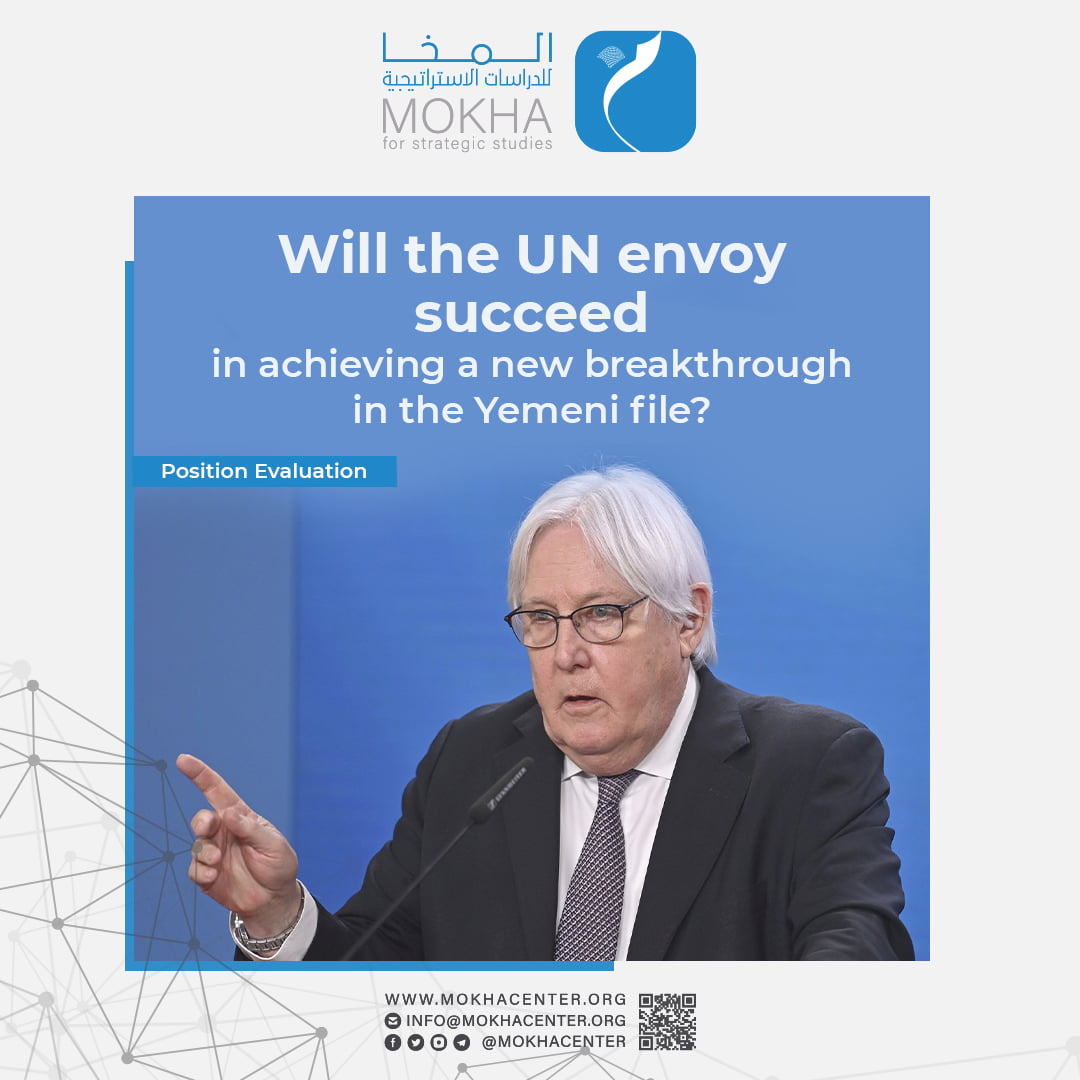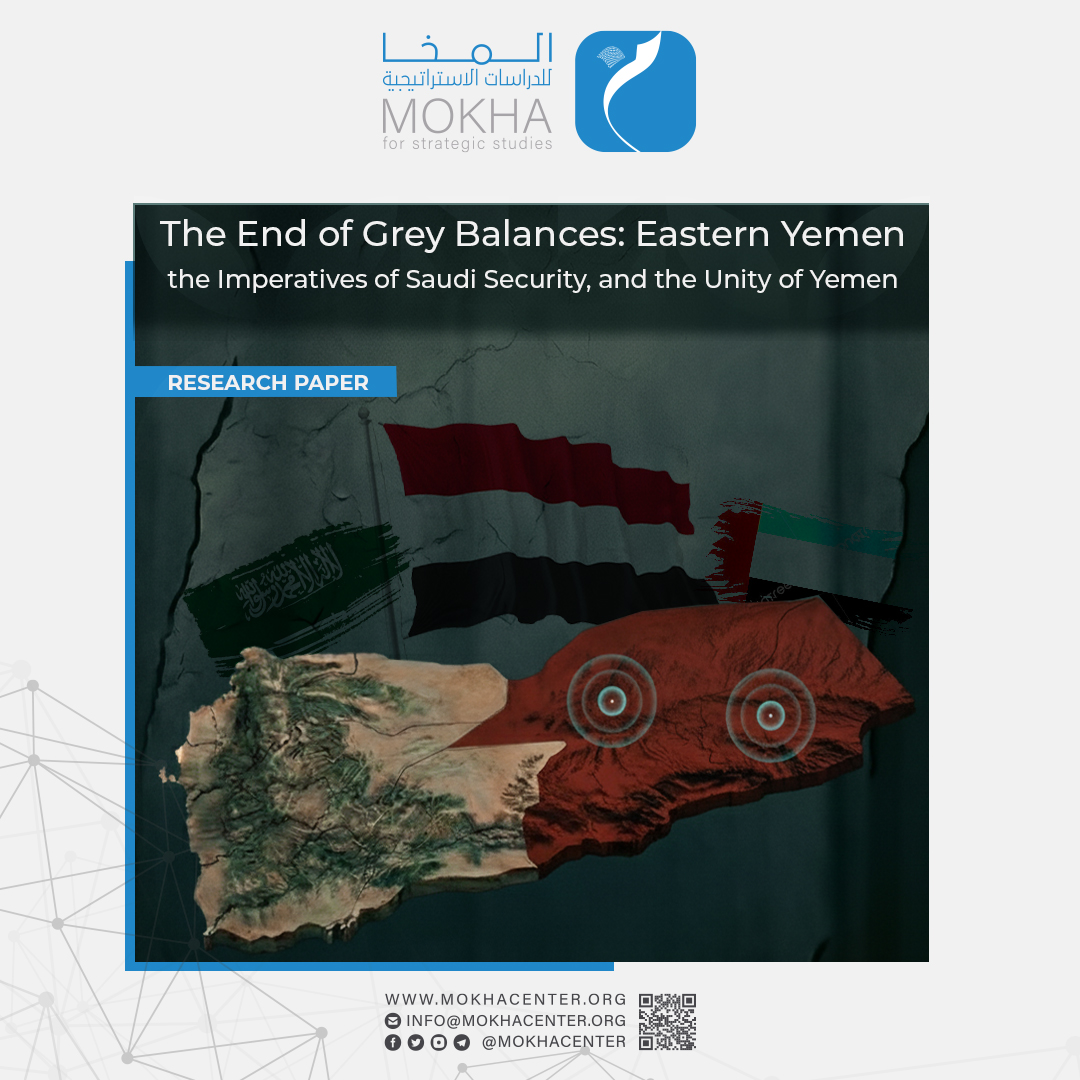Will the UN envoy succeed in achieving a new breakthrough in the Yemeni file?

Introduction:
The visit of Martin Griffiths, the United Nations envoy to Yemen, to Sana’a, comes nearly a year after his previous visit. The Houthi Insurgency refused to meet him after he was appointed as Under-Secretary-General for Humanitarian Affairs and Emergency Relief Coordinator. This visit coincides with international and regional efforts that seek to achieve progress in Yemen.
Since The UN envoy’s designation on February 14, 2018, he has been leading unremitting efforts to achieve a solution to the Yemeni crisis; his top priority is to address the humanitarian crisis, open air and sea lines, achieve a ceasefire and revitalise the political process.
Regional and U.S. efforts have been supportive of Griffiths’ efforts through:
- Meeting of the Omani Foreign Minister with his Yemeni counterpart.
- Visit of the Omani delegation to Sana’a.
- The Kuwaiti Foreign Minister’s visit to President Hadi.
- Contacts of the U.S. Secretary of State with his Omani counterpart.
- Contacts of the U.S. Secretary of Defense with the Saudi Crown Prince.
- Visits of the U.S. envoy to Yemen to Saudi Arabia, Oman, the UAE and Jordan.
However, Griffiths’ efforts, the factors of his success and failure, and the future of the Yemeni crisis under these diplomatic moves remain in question.
Prominent visits of the UN envoy:
| No | Place | Date | Figures | Topics |
|
|
Riyadh | March 2018 | The Yemeni President, Vice President, Prime Minister and Head of the Islah Party |
|
|
|
Sana’a | March 2018 | Houthi Insurgency officials and leaders of GPC in Sana’a. |
|
|
|
Hodeida | November 2018 | The Acting Governor of Hodeida, appointed by the Houthi Insurgency |
|
|
|
Muscat | July 2019 | Omani Foreign Minister |
|
|
|
Sana’a | December 2019 | Abdul-Malik al-Houthi and
Mahdi al-Mashat |
|
|
|
Sana’a | March 2020 | Houthi Insurgency officials |
|
|
|
Marib | March 2020 | The governor of Marib and members of the local authority |
|
|
|
Riyadh | August 2020 | Vice President and Head of Government, the Saudi ambassador to Yemen |
|
|
|
Riyadh | September 2020 | The Speaker of the Yemeni Parliament, the Yemeni Minister of Foreign Affairs, and the Saudi Deputy Minister of Defense |
|
|
|
Aden | January 2021 | Prime Minister, Minister of Foreign Affairs of Yemen and Governor of Aden |
|
|
|
Tehran | February 2021 | Iranian Foreign Minister |
|
|
|
Muscat | June 2020 | Omani Foreign Minister |
|
|
|
Muscat | October 2020 | Omani Foreign Minister and Houthi Insurgency Spokesperson |
|
|
|
Muscat | May 2021 | Muhammad Abdul Salam and Omani officials |
|
|
|
Sana’a | June 2021 | Abdul-Malik al-Houthi |
|
Evaluation of the UN envoy’s achievements:
It seems that Griffiths showed intense diplomatic activity and movement compared to his predecessors, and the results of this activity are:
- He obtained the international support and endorsement that his predecessors did not.
- He decided to move from the goal of a comprehensive solution to humanitarian solutions as a prelude to a comprehensive solution, and he did not build on the efforts of his predecessor, in addition to the results of the Kuwait negotiations.
- His visits to Russia, Iran, Egypt, Saudi Arabia, UAE, Oman and Jordan.
- Despite his visits to a number of Yemeni governorates such as Sana’a, Aden, and Hodeida, Taiz and Marib did not receive as much attention as Hodeida did.
- His great optimism about the visits and negotiations, except for the previous point.
- He presented some proposals, in which he was accused of violating the Yemeni peoples’ rights. This procedure made him appear to be biased toward the Houthi Insurgency, and this may explain the reasons of President Hadi’s refusal to meet with him more than once.
- His repeated attempts to bring the Houthi Insurgency closer to negotiations, and this was evident through pressure to remove them from the terrorism list. However, the Houthi Insurgency does not see him as a neutral mediator.
- He partially succeeded in stopping the battle of Hodeida, which occurred in favor of the Houthi Insurgency (Ansar Allah), and implementing the prisoner and detainees deal.
Factors of his success:
The UN envoy tried to achieve a breakthrough in the Yemeni file and has already been able, so far, to make some progress in the Stockholm Agreement. He can be more successful due to the following factors:
- The international community support in addition to the regional support for his efforts from Saudi Arabia and Oman.
- The success in Stockholm was partly due to its compatibility with the international determination on one hand, and the international pressures exerted on Saudi Arabia in regional files, on the other, which stopped the battle of Hodeida.
- Griffiths’ efforts have direct support and supervision.
Factors of failure:
- He did not use the capabilities of the Security Council to put pressure on the Houthi Insurgency, whom he described in his recent briefing as “obstructing” the peace process in Yemen by continuing their attack on Marib.
Potential Scenarios:
UN envoy Martin Griffiths seeks to accomplish his final attempt through his visit to Sana’a, which may result in one of these scenarios:
Scenario One: Complete Failure
This scenario predicts Griffiths’ failure to achieve any new progress for the following reasons:
- His inability to provide anything despite previous efforts supported by the UN, international and regional communities, which makes him appear more pessimistic than before.
- Prolongation of the Houthi Insurgency (Ansar Allah) escalation in Marib, as their late successful attempt of bombing the gas station.
Scenario Two: Complete Success
This scenario is expected to be fully successful based on:
- The pressures exerted by the international and regional communities, which may compel the Houthi Insurgency (Ansar Allah) to accept any cease-fire settlement.
Scenario Three: Partial Success
International efforts, including Griffiths’ efforts, can achieve a partial breakthrough based on the following indicators:
- The UN envoy and the U.S. State Department hold the Houthi Insurgency responsible for the failure of the previous negotiations, and this may represent a means of pressure, but it will not amount to achieving a comprehensive solution.
- The intensification of the activities of the Omani Foreign Ministry, which is an acceptable mediator for the Houthi Insurgency, facilitated the political movements of their delegation, and this, in turn, could cause a breakthrough in the humanitarian file.
- International pressures on the countries of the Coalition may compel them to accept any settlement to get out of the international embarrassment.
- Failure of the Houthi Insurgency in Marib.
The Likelihood of scenarios:
It appears that the partial-success scenario in some files is the likely scenario, whether at the end of the Griffiths period or after, but, if these conditions are met:
- Exerting strong international and regional pressure on the Houthi Insurgency (Ansar Allah).
- The Houthi Insurgency’s realisation that sealing Griffiths’ record with an achievement ensures that they will not be held fully responsible for what is happening in Yemen.
- Progress in international negotiations for Iran regarding the nuclear file; hence Iran is invested in the nuclear energy before regional issues, to achieve the greatest results in the negotiations Iran might withdraw its’ interests in Yemen.
Conclusion:
International efforts may be able to achieve a new breakthrough on the Yemeni issue, and any partial success depends on the extent of the progress in the political process. If this success is achieved, the Yemeni issue will be more internationalized, and the coalition might lose some of its legitimacy in interfering in the Yemeni file. Moreover, this will open new doors for the Houthi Insurgency in the international community at the expense of the Yemeni cause and the security of the region.


Несомненно трендовые новинки мира fashion.
Абсолютно все события лучших подуимов.
Модные дома, торговые марки, гедонизм.
Интересное место для стильныех хайпбистов.
https://lecoupon.ru/
https://lecoupon.ru/